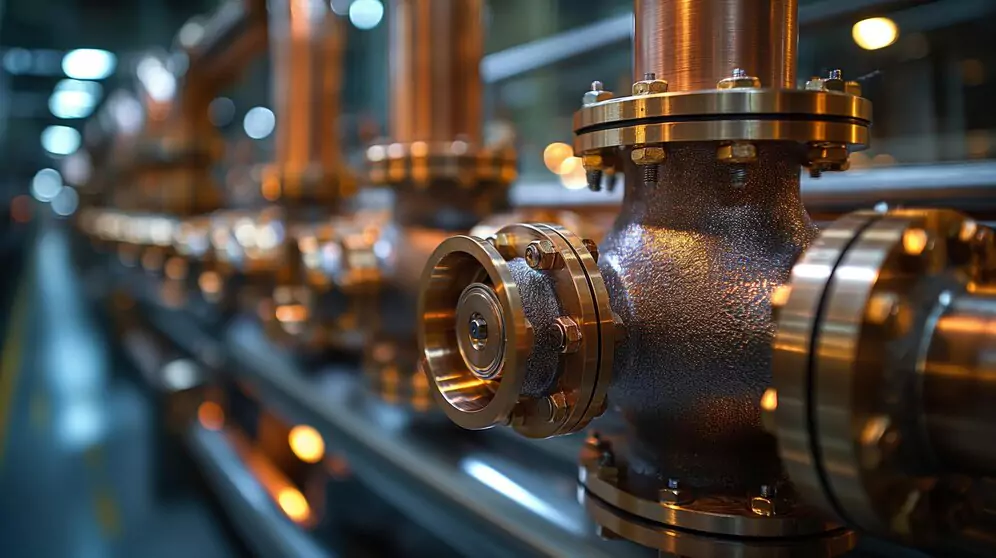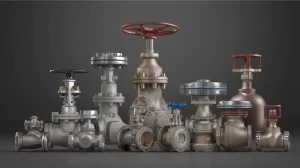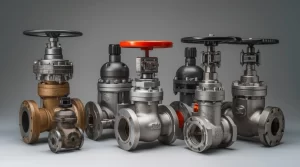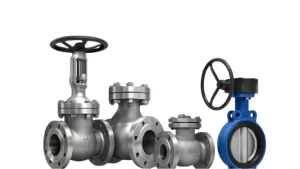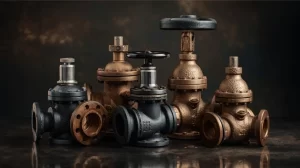Table of Contents
ToggleIndustrial valves pertain to mechanical devices that are responsible for opening, closing, or partially obstructing passageways in order to regulate the flow of liquids or gases within a system.
These valves comprise several types, and materials, too. While there are tons of different valve materials around, this discussion will focus on:
– Copper valves
– Stainless steel valves
– Carbon steel valves
– Cast iron valves
– Bronze valves
With a wide range of options regarding this today, finding the one that suits your needs the most can be a challenge. So, read on for your guide.
The 5 Different Types of Valve Materials
| Valve Material | Key Properties | Applications |
| Copper Valves | Excellent corrosion resistance, thermal and electrical conductivity, high ductility | Oil and gas industries, chemical processing, water treatments, pharmaceuticals, HVAC systems |
| Stainless Steel Valves | Corrosion-resistant, durable, able to withstand high pressures and temperatures, low maintenance | Chemical processing, oil and gas industries, food and beverage industries, water/wastewater treatment, pharmaceuticals |
| Carbon Steel Valves | High strength-to-weight ratio, corrosion-resistant, tensile strength, low cost | Petrochemical industries, power generation, water treatment, manufacturing industry, chemical manufacturing |
| Cast Iron Valves | High durability, excellent corrosion resistance, thermal stability, cost-effective | Fire protection systems, plumbing systems, wastewater treatments, HVAC systems, water supply systems |
| Bronze Valves | High strength, machinability, corrosion resistance, resistance to chemicals | Marine applications, safety relief systems, flow control systems, fire protection systems, petrochemical industry |
1. Copper Valves
As their name implies, copper industrial valves are devices made basically of copper, designed to control the flow of fluids in various applications. Their strength, corrosion resistance, and durable properties are what make them valued the most.
Copper is best known for its electrical and thermal conductivity, including for how it can effectively resist corrosion and wear. This material is also regarded for its fantastic ductility, able to perform at its peak even in high temperature applications.
Copper valves are used for:
- Oil and gas industries
- Chemical processing
- Water treatments
- Pharmaceutical manufacturing
- HVAC systems
2. Stainless Steel Valves
Made with stainless steel – the same material utilized to manufacture your kitchen utensils, healthcare equipment, cars, and more – these valves are designed likewise for superior liquid and gas flow control. They are also very durable and resistant against corrosion.
Because of how easily they are shielded from corrosion, they are ideal for use in harsh environments. These valves are also highly durable, able to effectively withstand high levels of pressures and temperatures.
Another great advantage of choosing these valves is how they require less maintenance, so they can last you longer. They are versatile in the following use cases:
- Chemical processing
- Oil and gas industries
- Food and beverage industries
- Water and wastewater treatment
- Pharmaceuticals
3. Carbon Steel Valves
Beginning with the basics, carbon steel is touted as a special kind of steel that features a much higher concentration of carbon compared to those of other steel material variants
So, carbon steel industrial valves are made of this material also for liquid and gas flow control. With their high ranges of strength-to-weight ratios, they can finish strong while remaining lightweight.
Tensile strength is also what these valves take pride in. With this, they can resist deformation even under stress, which is important when they’re used in high-pressure settings.
Carbon steel industrial valves are also resistant against corrosion, thanks to the workings of their protective oxide layers each time they’re exposed to oxygen. Apart from requiring minimal maintenance, too, they are also interestingly some of the cheapest valves on the market.
Their best use cases include:
- Petrochemical industries
- Power generation
- Water treatment facilities
- Manufacturing industry
- Chemical manufacturing
4. Cast Iron Valves
You are familiar with cast iron as the material used in fences and even in cookware, sometimes. But, did you know this material also works perfectly for industrial valves? How cast iron materials regulate the flow of gases and liquids in industries should also be noticed.
They are highly durable and highly strong, making them suitable even in low-pressure environments. Their excellent protection versus corrosion helps these valves keep their integrity over time.
In addition, with their unmatched thermal stability property, they can efficiently withstand a variety of temperature ranges that other types of industrial valves cannot. Cast iron valves are reliable, high-performing, and cost-effective.
Some of their noteworthy applications are:
- Fire protection systems
- Plumbing systems
- Wastewater treatments
- HVAC systems
- Water supply systems
5. Bronze Valves
Last, but certainly not least, are bronze valves. Their impressive uses are anchored upon their history. Bronze, as a material, is one of the first alloys from the Bronze Age between 3300 to 120 BC, and gradually earned the reputation of being an industry standard for its pressure-rated capabilities.
Compared with pure copper, bronze exhibits higher strength, is easily cast, and has greater machinability. Thus, bronze valves are highly resistant against corrosion, as well as against a wide array of disruptive chemicals.
The most popular applications of bronze industrial valves are as follows:
- Marine applications
- Safety relief systems
- Flow control systems
- Fire protection systems
- Petrochemical industry
Comparing Valve Materials: Which Material Should You Choose?
Well, which material to choose for your industrial valve and its applications depends on what you need precisely. Copper valves can provide magnificent corrosion resistance, but if you want a valve with stronger durability, choose stainless steel valves.
Carbon steel valves are durable as well, but they may not be as resistant versus rust and corrosion unlike the stainless steel variant.
Want to save on the costs? Cast iron valves are incredibly affordable compared to the rest, but they are not as durable as bronze and stainless steel valves. However, bronze valves work best for marine applications.
Gowin is one of the finest sources of industrial valves today. Doing business since 2007, they deliver top-tier industrial valve products for various industries. With Gowin, you are in good hands.
They keep a proven track record of maintaining the most professional relationships with their wide range of clientele, ensuring them of quality service from start to finish. Experience the best for your industry. Talk to them today to see what’s in store for you.

